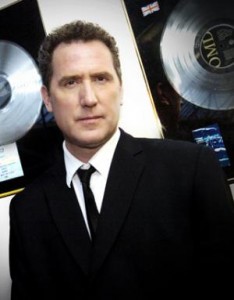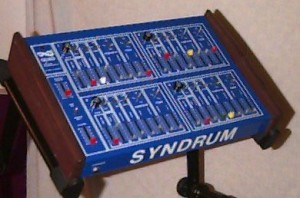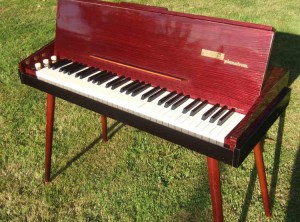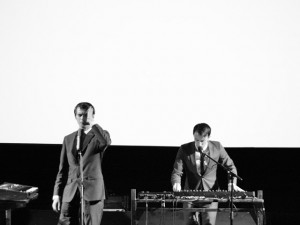Andy McCluskey OMD
What does the future sound like? – An exclusive interview with Andy McCluskey of OMD
Time for yet another synth-pop pioneer to enter the front stage, here at Stereoklang. I had the pleasure to talk to none other then Andy McCluskey, 50% of the legendary act Orchestral Manoeuvres in the Dark, OMD for short. Few other acts have had such an influential role in the development of the electronic pop music scene, with classic hits like Maid of Orleans, Enola Gay, Messages to name but a few. I wanted to ask Andy all about OMDs re-emergence on the music scene, their work in the studio, past and present, and of course their most recent album “History of Modern”.
Looking back
For those growing up in the late 70’s and 80’s, OMD was as well-known to “synthpoppers” as any of the other leading acts at that time, i.e. Kraftwerk, Depeche Mode, Tears for Fears, Gary Numan, Yazoo to name but a few. I asked Andy how it all started. He lets us know that he and Paul started composing music when they were about 16, basically making music with what they had at hand (consider this was mid 1970s really primitive in other words). Andy was asked to join the band that Paul was involved in, but pretty quickly realized that they had much more in common and decided to go on their own. So in the very early days, what was later to become OMD, it all started as a pure hobby. Back in Liverpool it is easy to picture two young guys at home listening to Kraftwerk and dreaming of success. It was also in Liverpool that their first real gig came about, at a club called Eric’s. It was also at Eric’s that they saw other bands that were thinking along the same lines, like The Normal (featuring Daniel Miller) that made Andy and Paul realize that what they were doing had relevance on the music scene.
Steelberry Clones – “where did the band name come from?” Andy – “we were assigned to do a one off event and we really wanted to come up with the most preposterous name they could ever think of – Orchestral Manoeuvres in the Dark – having absolutely know meaning whatsoever”. “There were no master plan!”.
Biggest milestone
With a career covering decades I certainly thought that Andy would think of any of their great concerts or when any of their now legendary albums like the poetic “Architecture and Morality”, ecstatic “Junk Culture” or “Dazzle Ships” hit the shelves, selling millions of copies, being the obvious choice. But no, Andy tells me that the biggest milestone for him was when he, in his own hands, was holding their first ever 7” vinyl single “Electricity”. “This was a record by Paul and I!”, Andy says. This must truly have been a magic moment, as a any teenager at that time with a passion for music would browse through the import boxes in your local record shop as a weaken treat, finding rare issues of cool acts, imagine then to find your own piece of work.
With the single in hand, gigs started to come and OMD played as warm up act to Joy Division. Then Gary Numan, who had just bought their single Electricity asked if they would like to perform with him. The following year OMD themselves were the main attraction. Andy also remembers that this was also the first time, when performing with Joy Division, that they saw a real Pollard Syndrum in live action. The Pollard Syndrum was one of the first electronic drums and was capable of many different sounds. The sound favored by most recording artists was a sine wave that pitch-bends down, most famously heard at the beginning of “Good Times Roll”, the opening track of the Cars’ 1978 debut album.
History of Modern
“History of Modern” represents a highly anticipated come back from one of the most influential electronic pop acts to date. Skeptics were questioning if they could re-invent themselves and why are they doing a retro-flirt. I kindly asked Andy about the retro-flirt and although Andy was not so keen on the term retro in relation to the new album he admits that if going back to your roots and re-discover that unique and distinctive OMD sound, ”then yes let us call it retro”. For Paul and Andy it was really important to get that “voice” of OMD back, that sound they left behind. “We spoke with our own authentic sound”, Andy says.
Starting to work on the new album it was important to OMD that it shouldn’t be a copy; they needed to have new and fresh ideas. According to Andy “there are too many bands of our generation that do not have anything more to say.”
Who needs analog gear?
Whether you’re a synth geek or not, talking with OMD without spending time discussing synthesizers is unheard of. In relation to their new album it is kind of refreshing to hear Andy speak so warm-heartedly about modern music production and the use of computer technology more or less all the way. Andy and Paul are ProTools fans and in the beginning Dropbox acted as their main way of communication.
Interestingly enough though, this way of making music was not creative enough so they went back to make music in just the same way as they did when they recorded their first albums. OMD has always played all their sounds, tunes and chords live and basically only having a drum machine playing some sequenced rhythms to accompany them in the recording sessions. “In those days we used a tape machine as our DAW, we recorded on tape and then literally cut and pasted the tapes, so I would sit by the tape machine and Paul by the keyboard, now I sit by the Mac and Paul still by his keyboard”. Speaking of ProTools I asked Andy if he had any particular favorites plugins and with no hesitation (and possibly with know surprise to me) he mentions EchoFarm. “I am huge fan of EchoFarm, switching it on and instantly everything sounds like the old days.”, says Andy.
“Back then everything centered around classic analog Korgs, Rolands but now we are purely software based”. “The first synth we acquired, via a mail order service and cost us 7GBP for 36 weeks in a row, was the Korg Micro Preset”. “Looking back it was a horrible piece, but it did kick start the sound you here on Messages and Enola Gay”. “Other gear that created our sound was e.g. the Vox Organ, my bass guitar and a Korg MS20”. “That was it really”. But their arsenal of arms grew over the years and the money from their hits made it possible to add polyphonic keyboards like Prophet 5 and Oberheim OB-X and also samplers like Emulator and Novatron. I remember reading the full list of equipment on the inner sleeve on Dazzle ships – a rare statement on an album in the broad pop genre. Andy, however, stops for a second while we delve further into something that starts to become a vintage synth porn discussion, and remembers another classic piece of equipment that they used; the Selmer Pianotron, a strange keyboard that Andy hasn’t seen anywhere since, sounded pretty much like a Kalimba, and apparently added the right ingredients to Electricity. The Selmer Pianotron and the Weltmeister Claviset are virtually identical instruments. The most probable reason for this is that Weltmeister manufactured all of these electric pianos, and Selmer imported and rebadged them for sale in the UK.
The three knobs to the left of the keyboard are used to adjust tremolo speed/depth and bass boost, but none of the controls really make a noticeable difference in sound. I assume the bass boost is a passive circuit just like the Rhodes Bass Boost control. Volume is adjusted on the bottom of the piano with a knee lever that can be folded up for storage and transport.
Searching the authentic
I recently interviewed the new UK act “Mirrors” who really has made a splash on the electro / synth pop scene and Mirrors also became the warm up act for OMD during the spring. Mirrors consist of four young guys in suits operating analog synths (German vibes anyone?). Andy tells us that, although he thinks Mirrors are a really cool act and have created a characteristic sound, they are typical in their search for the authentic. “I see a juxtaposition between having it all handmade and being electronic.”, says Andy.
And although Andy finds himself too old to explore everything new he does seem to be fairly updated on today’s synth scene, he’s a huge fan of the Swedish singer Robyn, and continues to add more obscure acts like Zebra and the Snake from Finland, as well as Andreas Kleerup. “I am definitely not an expert, but yeah I do go looking”, says Andy.
Experimenting
If anything, OMD are renowned for their experimentation and Andy says that many of their early songs started out as mere noise and sound landscapes, and when contended, added melodies on top. This is especially true for the album “Dazzle Ships”, which often, and at the time, was seen as too far out. Today, the album stands out as very forward-looking and precious to many. Based on this I came to discuss with Andy the role of experimentation today (and as some claim; lack of experimentation on their recent deliveries). Andy says that when they started they were completely open minded – being experimental was almost seen as a means to and end. “We wanted to change the world – today it may seem naïve.”, says Andy. However, this was how precious music was to these guys, back then and as Andy now says you cannot be experimental for its own sake – “music has to give something to somebody, it needs to stand the test of repeated listening”.
I guess the days when you stand by your gear saying “Wow, what a cool sound…”, has somewhat passed its expiration date for OMD.
Experimenting may also include embracing of new platforms and media to deliver music, that’s why I asked Andy how much they have embraced the world of iPads, tablet synths etc. Well, based on the fact that Andy earlier on in the interview showed his love for ProTools and more or less letting all his analog gear remain in the closet, it came as no surprise that Andy says “anything is great that can produce noise”, and continuing saying that; who would not wanted to have access to all these mobile soft synths, in the tour bus, back then?
What does the future sound like?
“What does the future sound like?” is the recurring mantra in everything OMD is set out to do for their next album, adding “Can we make that?”. Andy is well aware of that we are living in a post-modern era where pop music is basically eating itself. OMD going forward is all about controlling their own destiny. For us here at Stereoklang the logical follow-up question to this bold statement is of course when the next OMD album will hit the stores and what it will sound like? “Any *f-ing* thing we say it will sound like”, Andy replies with a good portion of humor, I must add.
The new album is coming? >> “It will be ready, MAYBE, in 2013”
Taking the initiative
The 21st century kicked off as the era for revival of old synth acts, several famous acts, such as Alpha Ville and Ultravox, has decided to bring up their old gear and songs onto the stage again, dusting of their now classic hits. OMD on the contrary, although the fact that 80’s synth pop is very fashionable among young people today, did not follow that route. Paul and Andy had not been in the same room for 16 years when German national TV called them in 2005 and asked if they would like to come on stage. So in a sense it was a bit of an accident, and although Paul was a bit reluctant at the start OMD are now touring again – and with such a huge success I must add.
However, the landscape OMD are now touring in, has changed quite a bit, so at the end of the interview I briefly discussed how social media is shaping the musical arena. “The music industry is in a very strange place today. The labels did not respond to the new media. You and I remember buying vinyl or even CDs, but today music is an icon on my son’s laptop, without any perceived value”, says Andy.






